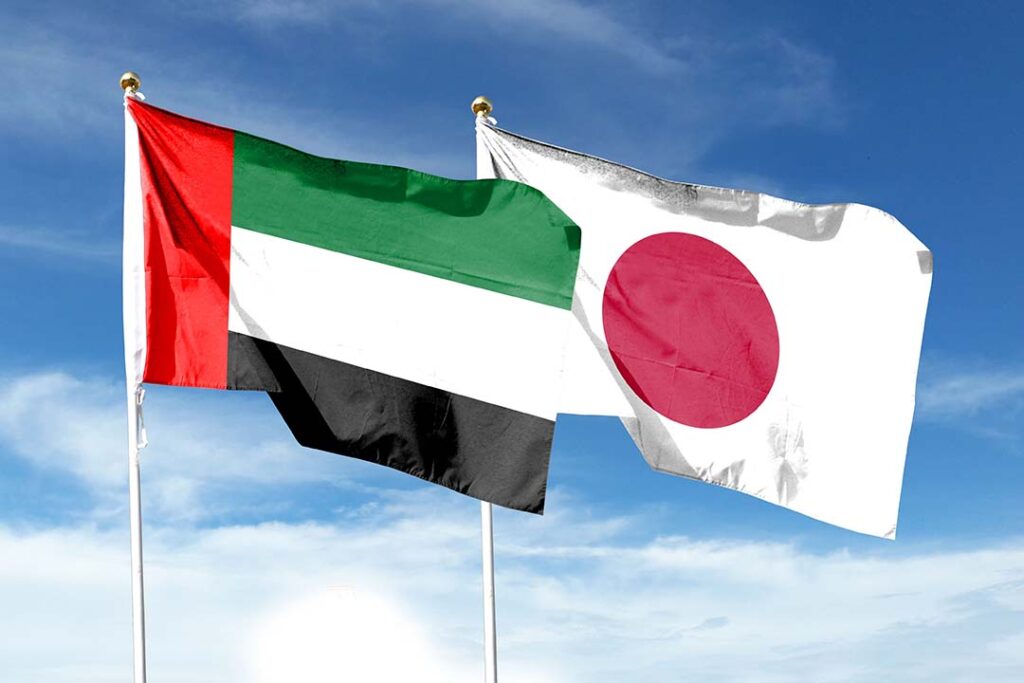In the dynamic and ever-evolving landscape of international relations, Hong Kong and Japan share a well-established partnership rooted in decades of robust relations, particularly firmly entrenched in commercial ties. Hong Kong remains a highly valued partner to Japan, with which it maintains tight trade connections. As two economic powerhouses in the Asia-Pacific region, their collaboration not only underpins regional stability but also drives business innovation and sustainability initiatives, particularly in the context of the Greater Bay Area (GBA) Region.
“Japan and Hong Kong are important trade partners for each other, with Hong Kong being the 12th largest trading partner for Japan in terms of total imports and exports, and Japan being the fifth largest trading partner for Hong Kong in terms of total imports and exports. Both regions maintain a free and open trading system based on the multilateral trading system with the World Trade Organization (WTO) at its core,” HE Ambassador Kenchi Okada, Consul General of Japan in Hong Kong, pointed out. “Based on the said system, the two regions maintain a close trading relationship and conduct trade across a wide range of sectors, including electronic machinery and equipment, precious metals, precious stones and pearls, agricultural, forestry, fishery products and food, nuclear reactors, boilers, and machinery,” he added.
Charting a course as logistics and maritime hubs
At the core of this relationship is Hong Kong’s critical position as a logistical and maritime center for the GBA. Hong Kong, geographically located at the crossroads of Greater China and Southeast Asia, acts as a trade and investment hub, allowing for easy communication between regional markets. With its well-developed infrastructure and business-friendly climate, the city serves as an economic catalyst, attracting multinational corporations and fostering cross-border partnerships.
“Within the maritime sector I am seeing acceleration in cooperation and joint developments within the Guangdong-Hong Kong-Macao Greater Bay Area. In this regard, the authorities in Guangzhou and Shenzhen have both expressed great interest in working more closely with Hong Kong. More than that, specific projects are starting to take shape,” Hing Chao, Executive Chairman of Wah Kwong Maritime Transport Holdings, noted. “There are so many opportunities to collaborate, across diverse areas in the maritime space alone—from ship management to ship leasing and finance, arbitration and legal services, marine insurance, and of course marine tech,” he underscored.
Hong Kong and Japan also have a long history of maritime cooperation, with both countries functioning as important hubs for global trade and business. Moreover, both nations boast modern port infrastructures, effective logistical networks, and a dedication to marine safety and sustainability, moving forward with green initiatives in the maritime sector. Through collaborative initiatives and partnerships, they leverage their shared expertise to drive innovation and ensure the seamless flow of goods and services across international waters.
As Angad Banga, Chairman of the Hong Kong Shipowners Association (HKSOA) and Chief Operating Officer of The Caravel Group emphasized: “Hong Kong has been and will continue to be, in my opinion, a leading international maritime center, not just in the Asia-Pacific but also globally. Without a doubt, Japan is also a global powerhouse in the maritime arena, with strengths in shipbuilding, ship owning, insurance, and financing. Both Hong Kong and Japan have complementary strengths that allow for significant collaboration. The HKSOA membership includes many members with extensive experience in ship owning, shipbuilding, and chartering, fostering partnerships at the enterprise level.”
Both Hong Kong and Japan have complementary strengths that allow for significant collaboration.
Angad Banga, Chairman of the Hong Kong Shipowners Association (HKSOA) and Chief Operating Officer of The Caravel Group
Leading the charge in innovation and green transition
Japan likewise brings its technological prowess and innovation-driven mindset to the shared table of diplomatic relations. Renowned for its cutting-edge advancements in various industries, including electronics, automotive, and renewable energy, Japan raises the benchmark of innovation and sustainability to address current challenges. “Japan and GBA share some common challenges, and cooperation is expected and anticipated in the fields of healthcare and elderly care, clean energy and environment, as well as agricultural, forestry, fishery products and food, where both regions have accumulated technological expertise and knowledge over the years,” Ambassador Okada elaborated.
Specifically, Japan’s commitment to environmental, social, and governance (ESG) principles aligns with Hong Kong’s vision for a green transition and sustainable development. In an era marked by environmental consciousness and sustainability, Hong Kong and Japan have both embraced the green transition with stalwart determination. Recognizing the critical need to address climate change and promote sustainable development, these partners are leading by example by incorporating (ESG) principles into their business processes.



Companies such as Wah Kwong Maritime Transport Holdings and TCC Group, a prominent player in the shipping sector, exemplify this commitment through their adoption of environmentally friendly practices and investments in green technology. Tai Chong Cheang Steamship Co. (H.K.) Limited, a subsidiary of TCC Group, has been at the forefront of promoting sustainable shipping solutions, contributing to the reduction of carbon emissions and marine pollution. Meanwhile, ventures such as Suga Electronics and NEC HK Ltd. are leveraging their expertise to provide innovative ESG solutions that address pressing environmental challenges. From renewable energy technologies to waste management systems, these companies are driving positive change and catalyzing the transition towards a more sustainable future. Even law firms like Stephenson Harwood are doing their share, with their involvement in shaping and upholding ESG policies in Hong Kong.
Same as Japan, Hong Kong has set an ambitious goal of achieving carbon neutrality by 2050, and has recently been working towards the introduction of extremely active measures such as regulations on disposable plastic products.
Kenichi Okada, Ambassador of Japan to Hong Kong
“Same as Japan, Hong Kong has set an ambitious goal of achieving carbon neutrality by 2050, and has recently been working towards the introduction of extremely active measures such as regulations on disposable plastic products. The Consulate-General of Japan and the Hong Kong Japanese Chamber of Commerce and Industry are working closely with the Hong Kong government authorities to support such efforts and to input opinions from the Japanese side,” Ambassador Okada highlighted.
Cooperating for the future of green technology
As the world increasingly turns to green technologies and sustainable practices, the partnership between Hong Kong and Japan is poised to play an even more pivotal role in shaping the future of business and environmental stewardship. With their combined strengths and shared values, these two economies are well-positioned to lead the way in ESG innovation and to promote sustainable development across the Asia-Pacific region.
As Ambassador Okada concluded: “We also look forward to more cooperation in the field of renewable energy, sustainable infrastructure and environmental technology…We believe that the current cooperation between Japan and Hong Kong should be further strengthened in order to achieve a green and sustainable society. The Consulate-General of Japan is committed to enhancing the collaboration and cooperation with the Hong Kong government and other stakeholders in this aspect.”














